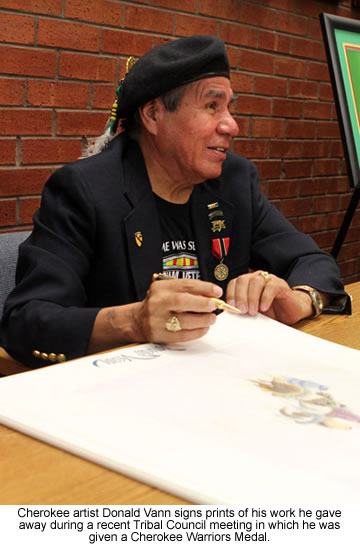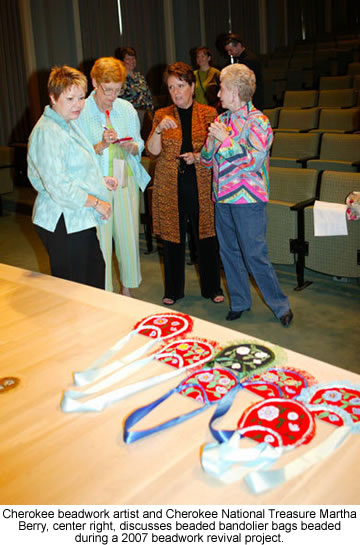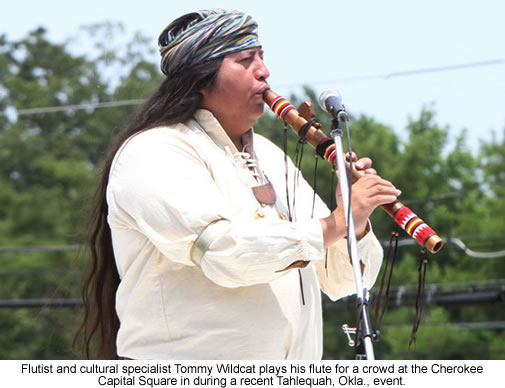 |
Canku Ota
|
 |
|
(Many Paths)
|
||
|
An Online Newsletter
Celebrating Native America
|
||
|
October 2013 - Volume
11 Number 10
|
||
|
|
||
|
Three Named
Cherokee National Treasures |
||
|
by Will Chavez - Senior
Reporter, Cherokee Phoenix
|
||
|
credits: photos by Will
Chavez - Cherokee Phoenix
|
| TAHLEQUAH, OK – Three Cherokee artists were honored as
Cherokee National Treasures this year before the Cherokee National
Holiday during Labor Day weekend.
One is a talented painter. One is a beadwork artist who brought Southeast beadwork back to the Cherokee people, and the other is a river cane flute maker and cultural specialist.
Shortly before his high school graduation, he dropped out and enlisted in the U.S. Army. Vann served in the Vietnam War with the 1st Calvary Aviation Division as a door gunner on a helicopter, dropping off and extracting soldiers from the battlefield. After the Army, he began his art career painting the images of his Cherokee heritage. As Native American art's popularity grew in the 1970s, Vann's skills were in demand, and he soon found himself with a business partner starting a publishing company called Nuwoduhi Galleries, later renamed Native American Images. Before long, Vann's artwork was displayed in galleries across the world, on television shows and movies and in the homes and offices of private collectors. "If I can make people see with their hearts and feel with their eyes, then I have succeeded," he said. Today, Vann makes his home and studio in Tahlequah with his family. He takes the occasional tour of galleries across the country, but most of his work is now showcased and sold online, including originals, prints and even low-cost posters. "Of all the awards I have received throughout my 53 year career, receiving one from my peers and the Cherokee Nation have meant the most to me," Vann said of the National Treasure Award. "I am honored and thankful."
"When I was first told I had been designated, I thought I'd feel a real sense of completion. Now that it is here, my feeling is much more one of rededication," Berry said. "I've always wanted to do good work, in order to build my own name. But now, it isn't just my name on my work. I now represent all the other National Treasures and the Cherokee people as a whole. I'm anxious to do even better work, to continue to live up to the honor and trust that has now been placed in me." Berry, 65, of Tyler, Texas, taught herself the craft of beading and continues to research the beadwork of Southeastern tribes. She said Cherokee beadwork evolved from the trade network Cherokee people established with white traders in the 1600s. Glass seed beads, steel needles, silk thread and ribbon and cloth made of wool were traded for or bought from Europeans. By the late 1700s, Cherokee bead workers were skilled at their craft using trade materials. After 1840, Cherokee beadwork and the number of Cherokee bead workers dwindled due mostly to the forced removal of the Cherokees from their Southeastern homelands in 1838-39. Berry said following the removal the Cherokee people had no place in their lives for luxury items such as beaded moccasins, belts and leggings. She is credited with helping bring back beadwork to the Cherokee people and teaches others her craft. "Although this is the highest honor I have ever received, or will ever receive, I do not feel it closes a circle at all. I feel a rejuvenation, a vigor and an anticipation for the future. I want to make beautiful things. I want to teach more and more people to do the same, and I want to grow more and more teachers of traditional Cherokee beadwork. This wonderful moment is just the beginning," Berry said.
Wildcat, 46, was honored as "Flutist of the Year" at the 2002 Native American Music Awards. His music is heard in CN facilities and at many historic sites in northern Georgia. "I'm very honored to be a National Treasure. It brings back the many years with my father (Tom), a National Treasure, of the 25 years of learning and teaching our heritage to family and friends, and the thousands of venues that I toured by myself or with my father, family or friends," Wildcat said. "I'm very happy and grateful for this honor." The Cherokee National Treasure project began in 1988 to honor artisans and preserve and revive artistic practices that may be lost from one generation to the next. They are selected because they have shown skill, cultural and historical knowledge and are committed to education and cultural preservation. |
|
|
||
|
|
||
| Canku Ota is a free Newsletter celebrating Native America, its traditions and accomplishments . We do not provide subscriber or visitor names to anyone. Some articles presented in Canku Ota may contain copyright material. We have received appropriate permissions for republishing any articles. Material appearing here is distributed without profit or monetary gain to those who have expressed an interest. This is in accordance with Title 17 U.S.C. Section 107. | ||
|
Canku Ota is a copyright ©
2000 - 2013 of Vicki Williams Barry and Paul Barry.
|
||
 |
 |
|
|
The "Canku
Ota - A Newsletter Celebrating Native America" web site and
its design is the
|
||
|
Copyright ©
1999 - 2013 of Paul C. Barry.
|
||
|
All Rights Reserved.
|
||
 Painter
Donald Vann, 63, grew up in Stilwell in Adair County mimicking the
drawings of his uncles. He spent time in nature camping and hunting
with his grandfather. Those memories would one day become a part
of his paintings.
Painter
Donald Vann, 63, grew up in Stilwell in Adair County mimicking the
drawings of his uncles. He spent time in nature camping and hunting
with his grandfather. Those memories would one day become a part
of his paintings.  Beadwork
artist Martha Berry was born and raised in Tulsa. Her grandmother
and mother taught her to sew and embroider at age 5, and she later
became a professional seamstress. Berry creates elaborately beaded
bandolier bags, moccasins, belts, knee bands, purses and sashes
inspired by the styles of Southeastern tribes, including the Cherokee,
Creek, Choctaw, Chickasaw, Seminole, Yuchi and Alabama. Her work
is displayed in museums throughout the country.
Beadwork
artist Martha Berry was born and raised in Tulsa. Her grandmother
and mother taught her to sew and embroider at age 5, and she later
became a professional seamstress. Berry creates elaborately beaded
bandolier bags, moccasins, belts, knee bands, purses and sashes
inspired by the styles of Southeastern tribes, including the Cherokee,
Creek, Choctaw, Chickasaw, Seminole, Yuchi and Alabama. Her work
is displayed in museums throughout the country.  Cherokee
flutist and cultural specialist Tommy Wildcat of Park Hill has educated
people about Cherokee culture since 1988. He works for the Cherokee
Nation as a cultural specialist and travels the country with the
CN and on his own to share Cherokee culture, language and history.
He also shares traditional Cherokee songs using his five-holed Cherokee
river can flutes, which he makes by hand.
Cherokee
flutist and cultural specialist Tommy Wildcat of Park Hill has educated
people about Cherokee culture since 1988. He works for the Cherokee
Nation as a cultural specialist and travels the country with the
CN and on his own to share Cherokee culture, language and history.
He also shares traditional Cherokee songs using his five-holed Cherokee
river can flutes, which he makes by hand.